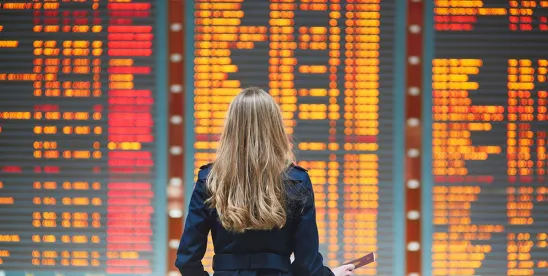In Walters v. Professional Labor Group, LLC, the U.S. Court of Appeals for the Seventh Circuit will decide whether employee travel time to and from remote jobsites that requires an overnight stay is compensable.
On April 29, 2024, the U.S. Department of Labor (DOL) filed an amicus brief urging the Seventh Circuit to affirm the district court’s ruling that employers must pay for such travel time and to extend the district court’s ruling to include travel time outside of regular work hours. If the Seventh Circuit adopts the DOL’s position, it could significantly expand the scope of compensable travel time for nonexempt employees in the Seventh Circuit who travel to remote jobsites.
Quick Hits
- The Seventh Circuit will decide whether the time an employee spends traveling by driving to and from a remote jobsite that requires an overnight stay is compensable.
- The district court ruled that such travel time is compensable when it occurs during normal working hours.
- In its amicus brief, the DOL agreed with the district court’s conclusion but argued that the compensable travel time at issue should not be limited to travel time during normal working hours. Rather, the DOL contended, it should include all travel time the employee spends driving to and from a remote jobsite that requires an overnight stay away from home.
Summary
Professional Labor Group, LLC (PLG) hires skilled tradespeople and contracts with clients to provide employees to work on certain remote and industrial projects throughout the country. The tradespeople, who are nonexempt employees, generally travel from their homes to the remote jobsites, staying at local lodgings near the jobsites for the duration of each project—sometimes days or weeks. PLG did not provide transportation to or from these overnight jobs. After an overnight job ended, employees either returned home or traveled directly to another overnight job. PLG did not compensate employees for time spent traveling to, from, or between overnight jobs.
On November 11, 2021, James Walters, individually and on behalf of similarly situated employees, filed a collective action complaint against PLG in the U.S. District Court for the Southern District of Indiana. The complaint alleged that PLG had violated the Fair Labor Standards Act (FLSA) by failing to pay employees for the time spent traveling to and from their home communities and overnight jobs, depriving them of overtime wages. On August 25, 2023, the district court granted summary judgment to Walters and held that PLG was liable for overtime violations resulting from its decision not to pay for travel time.
The district court concluded, “Because PLG hires tradespeople to travel to and between remote jobsites where they stay and work for days or weeks on end, the travel involved is exactly the sort of travel [covered by 29 C.F.R. 785.39],” the regulation that addresses travel away from an employee’s home community that requires an overnight stay. The district court further concluded that under 29 C.F.R. 785.39, “PLG must treat employee travel to overnight work assignments as compensable worktime when it occurs during normal work hours.” However, according to the district court, where travel time occurs outside of normal work hours, such travel time would not be compensable. The district court’s limited decision reflected the language of the regulation, which states, in pertinent part, “Travel away from home is clearly worktime when it cuts across the employee’s workday.”
PLG appealed the district court’s decision on December 8, 2023. On April 29, 2024, the DOL filed an amicus brief maintaining that the district court’s conclusion was largely correct. However, the DOL argued that the district court’s decision was overly restrictive and the compensable travel time at issue should not be limited to travel time during normal working hours. Rather, compensable travel time should include all time the employee spends driving to and from a remote jobsite that requires an overnight stay. Significantly, because PLG did not appeal this portion of the district court’s decision, the court of appeals can—but is not required to—address the DOL’s argument regarding travel time that occurs outside an employee’s regular workday.
Key Takeaways
On PLG’s appeal in Walters, the Seventh Circuit will review whether time an employee spends traveling to and from a remote jobsite that requires an overnight stay away from home is compensable under the FLSA when it occurs during regular work hours. It remains to be seen whether the court also will address the DOL’s position that such travel outside regular work hours is likewise compensable. Depending on the outcome, employers with nonexempt employees performing work at remote jobsites requiring overnight stays may be affected.





 />i
/>i

